This afternoon Y Combinator kicked off the summer session of Demo Day, the twice-a-year event where the prestigious startup incubator showcases its latest batch of companies in front of a throng of investors.
And wow, was this one a doozy. 63 companies — easily besting Y Combinator’s previous record of 43 — took the stage today for rapid-fire, 2 minute presentations that lasted three and a half hours, including some brief breaks. As usual, dozens of top investors from around Silicon Valley filled the hall (with a lengthy wait list for those who didn’t sign up in time), and they didn’t come away disappointed.
Though there were more companies than ever, the quality was still very high — I suspect this batch will have more home runs than any previous batch. Y Combinator cofounder and partner Paul Graham said that the acceptance rate was still a low 3%, but that the incubator is now receiving a huge number of applications, many of which are promising — hence the increased class size. In light of the growth of the program, Y Combinator decided to knock down a wall in their building and boost the size of their event room. It is a welcome upgrade.
Given the large number of startups presenting, YC also built a basic web application to help the investors keep track of which companies they wanted to speak to — investors simply hit a ‘Like’ button next to a company’s name, and the founders get notified that someone wants to talk to them.
For this batch, YC also took a different approach to pre-Demo Day funding. Historically, Y Combinator has sometimes held an Angel Day, when certain angel investors were invited to invest in companies prior to the larger Demo Day event. This sometimes led to some companies being off the market, so to speak, with over-subscribed rounds or no-shop clauses. This time, things are different — every company presenting is open to raising money.
Of course, all of the companies also have plenty of runway thanks to Yuri Milner’s Start Fund and SV Angel — which are collectively investing $150,000 in nearly every company in the current batch (Start Fund began investing in the last batch, and announced participation in this batch at TechCrunch Disrupt NYC).
One thing to note: while there were a whopping 63 demos today, a significant number of them were off the record, so they aren’t included in this post.
 Aisle50
Aisle50
Aisle50 has a straightforward pitch: Groupon for groceries. The company says that packaged goods business is worth 2 trillion. Food manufacturers like Procter & Gamble, General Mills, and Kraft spend $35 billion a year on marketing, half of which goes to free-standing inserts (those paper flyers in newspapers that are loaded with grocery products). But as these brands move to digital, they don’t want to be placed next to competitors on the page. Aisle50 lets them have the spotlight — you see one new product per day, which includes custom copy introducing the product (similar to the way Groupon does it). Buy one, and the site loads your grocery store rewards card with the deal. The company has deals with Lowes Foods, SuperValu, other major grocery chains.
 Launchpad Toys
Launchpad Toys
Launchpad wants to be the new “Lego of digital play”. Kids love to create new things using clay and Lincoln Logs, Erector Sets and more, and so Launchpad wants to recreate this experience for kids on digital devices, starting with iOS. Launchpad’s first app, Toontastic, captures creative storytelling and allows kids to create their own cartoons. They can move their cartoon characters around a touchscreen, record audio, and on Launchpad’s “ToonTube”, kids can then watch the cartoons they’ve created in video album form. Apple recently added Launchpad Toys to the App Store’s Hall of Fame.
 Interview Street
Interview Street
See our full post on Interview Street’s launch here
Interview Street is a platform for identifying promising programming candidates, using programming puzzles that are better than (and easier for companies to administer) than typical programming puzzles. Companies that are already using the platform include Facebook, Amazon, and Zynga. Interview Street typically earns $10,000 for each programmer hired (each company is charged based on how many tests are taken). Looking to build the biggest database of programmer data. They’re doubling revenue each month and are profitable.
 MixRank
MixRank
See our past coverage of MixRank here
MixRank has created a spy tool for AdSense. What does this mean? MixRank’s search engine for Google’s Adsense crawls all web pages running Google’s ad tool — and because Google then sorts these ads by how effective they are — the startup indexes that data and estimates how well they’re performing for their customers. As we wrote in June, MixRank’s service yields a ton of interesting data for advertisers. Using the startup’s dashboard, users can see that, of the different wordings for their Google ads (for example) one particular ad copy phrasing has been far more successful than its other pilots. MixRank uses its Google data, combined with its own crawling to serve businesses with performance analytics.
 DoubleRecall
DoubleRecall
DoubleRecall is a platform that allows companies to easily roll out digital brand-building campaigns that “actually prompt users to read an ad”. A news article might include, for example, an ad that asks users to pick out two words and enter them in the textbox below. It isn’t a huge hassle, and it works — in some cases well enough to make it so that the publisher doesn’t need a paywall. An initial customer is Forbes. This format is 11 times more effective than typical display ads. Publishers get more revenue, advertisers get remembered, and, users get free content with fewer ads. The startup got its start in Europe, where it made 150k in 3 months. Have signed Impre Media, Addmired, Forbes, Conde Nast, Pe.com.
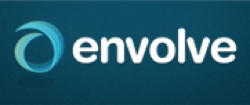 Envolve
Envolve
See our full coverage of Envolve’s launch here
Envolve offers customizable chat for websites. The service powers chat on 28,000 sites. Sites can install Envolve in two lines of JavaScript, and users that interact with the chat spend 4x time-on-site. Chat messages per day growing 29% month over month for the last 13 months, with users sending a total of 300,000 chat messages a day. UMG, Mitsubishi, Wired all use the platform.
 Quartzy
Quartzy
See our full coverage of Quarty’s launch here
Quartzy is an online marketplace for Life Science supplies. The life science consumables market is $9 billion, with 500,000 scientists buying from 1000 suppliers. But they don’t do a good job managing their inventories, they use things like Google Docs. Quartzy helps labs manage their inventories. “What we are doing is a little bit devious” — the site need only add a ‘buy’ button, and its inventory system becomes a marketplace.
 Munch On Me
Munch On Me
See our full coverage of Munch on Me’s launch here
Munch On Me has a simple value proposition: It wants to take the daily deals model scaled by Groupon and LivingSocial and apply it to the restaurant industry to be, simply, your go-to resource for “deals on dishes”. From the customer’s side, Munch On Me wants to help restaurants get discovered, offering a marketing solution for local restaurants that allow them to control the customer dining experience and even upsell their customers. According to the startup’s pitch, 75 percent of customers even go on to buy something at full price. While Groupon and LivingSocial are more one-size-fits-all solutions (targeting bargain hunters), Munch On Me is going after customer retention, touting an 100 percent merchant retention rate and are doubling revenue every month.
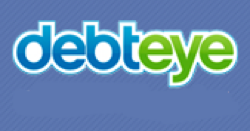 Debteye
Debteye
See our full coverage of Debteye’s launch here
Debteye is offering an automated credit counseling platform to those suffering from credit debt. It may sound like an obscure idea, but according to Debteye, which we covered in July, 10 million people spend over $2 billion on debt counseling and credit programs to help them extricate themselves from debt. Of course, the problem is that debt counseling solutions are labor and time intensive, so Debteye brings an easy automated software tool to the space that analyzes customer finances, recommends plans of actions for its customers, and even negotiates with creditors. Debteye wants to condense a 3-day ordeal into 7 minutes — and so far, it’s been working. Debteye has a has saved customers an average of $7K on expensive solutions, thanks to a team composed of debt counselors.
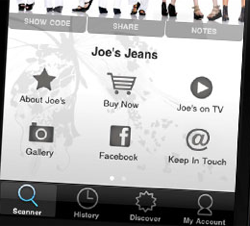 Paperlinks
Paperlinks
See our full coverage of Paperlinks here
Paperlinks has a simple pitch: the startup wants to be the go-to QR code resource for business and brands — but with a particular focus on the design of the code itself. Paperlinks turns posters into virtual vending machines, allowing users to scan a link with a QR code reader, giving its customers a UX similar to that of a custom native app to scan any link they want, pay for it, and walk to the retailer to pick it up. Bada bing, bada boom. So far, customers are buying the value proposition, as sales have been doubling every month, with clients including Nestle, Live Nation, and GNC, among others. After all, the technology is getting close to reaching a tipping point: 14 million Americans scanned a QR code in June.
 PageLever
PageLever
Check out our full coverage of PageLever here.
Facebook has a lot of brands and businesses using Facebook Pages, but the social networking giant’s internal analytics aren’t great. PageLever is trying to make Facebook analytics better by allowing users to easily track Facebook Page activity over time; for example, “did that status update about a new deal fade quickly, or were people still commenting on it a day after it was posted?” So far the company has attracted Disney, Starbucks, YouTube, and other brands to sign on, enabling these companies to track how their users are behaving after they become fans. PageLever is currently growing at 50 percent per week, with $25K in recurring revenue so far, and plans to scale aggressively as social continues to be built into the fundamental plumbing of the Web.
 MarketBrief
MarketBrief
Find our full coverage of MarketBrief’s launch here.
MarketBrief takes those hard-to-read SEC files and automatically converts them into news articles that are far more readable and easy to digest than the obtuse files produced by the SEC. Public companies have to report everything they do — last year there were 8.5 million pages of SEC filings — but those docs are hard to consume; but, with MarketBrief, those docs can be translated into articles in under one minute. The founders are the same guys behind SECWatch, which provided a rapidly-updated index of SEC filings but without the articles, that they founders have folded into MarketBrief. This is similar to what Narrative Science is doing for GameChanger.
 Snapjoy
Snapjoy
Check out our launch coverage of Snapjoy here
Snapjoy wants to be the place where you keep all of your photos — in the cloud. What’s the use case here? Well, take the much-touted new iCloud from your friends at Apple: While iCloud does in fact offer photo sync, an important feature, Apple’s new cloud isn’t really going big and trying to become the home for your photos, as they’ll only be keeping your photos in the cloud for thirty days. In comparison, Snapjoy organizes photos for its users, combining cloud storage with automatic photo organization. Snapjoy launched 15 days ago and its 2,500 users have already uploaded 1.8 million photos, which is an average of over 700 photos per person. “Our market is anyone with photos worth saving”, said Snapjoy Co-founder Michael Dwan.
 Opez
Opez
Check out our full coverage of Opez’s launch here
Opez wants to be Yelp for service professionals to attack an important problem: when small, independent service professionals, like hairstylists or bartenders or DJs move between venues, they often have difficulty taking their clientele with them. Essentially, Opez tells users who a particular service professional is, where they work, and gives them the ability to easily leave reviews. Opez wants to drive a shift in the balance of power in favor of employees from the venues themselves.
Opez users can also follow, say, a particular bartender, allowing the bartender to send them promotions, coupons, etc., and generally just keep them up to date on recent news and relevant info. Opez also offers their users their own branded business cards, allowing them to distribute their own brand more virally. The startup wants to turn independent professionals into their own Groupons, according to co-founder Chris Tam.
 Bushido
Bushido
Bushido is an app store for the cloud. Built on APIs and databases like AWS, Mailgun, and others, Bushido allows developers to focus on their own applications by taking the hassle out of the development process by wrapping the app in centralized authentication, hosting, billing distribution — things developers often don’t want to deal with. Bushido becomes the install button for the internet. Then all the users who use that app, become Bushido users, and then they have access to other apps on the network without having to sign up again. Data that flows into Bushido stays there. So far, users have launched 8k of instances of apps.
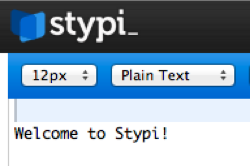 Stypi
Stypi
Check out full coverage of Stypi here
Stypi is a startup that is reminiscent of Etherpad, which was acquired by Google back in 2009. Stypi is focusing on becoming a way for people to take advantage of realtime code collaboration and extend realtime sync between native applications. Eventually, Stypi hopes to make all native applications collaborate.
 Proxino
Proxino
Check out full coverage of Proxino here
Proxino is a ‘smart JavaScript proxy’ that helps developers track the errors that occur in the client-side code of users’ browsers. Proxino’s tool scans JavaScript code so that it catches any errors and then notifies developers when something goes wrong. Proxino also minifies and caches code to increase speed.
 MongoHQ
MongoHQ
You can find our launch coverage of MongoHQ here
MongoHQ offers hosted Mongo databases in the cloud, allowing developers to outsource common tasks like deployments, backups, scaling, optimization, web tools, analytics, and business intelligence that’s associated with their Mongo database. . The company is already closing in on $50K in monthly recurring revenue, with revenue growing 13.2% per week (they’re profitable). Investors include Maynard Webb (LiveOps) and Scott McNealy (Sun Microsystems).
 Zigfu
Zigfu
Zigfu is developing a solution for developers that makes it easy to create motion-enabled apps (especially for Microsoft Kinect). Zigfu’s OpenNI installer allows developers to set up their development environments in one click, bundling OpenNI, NITE, and SensorKinect and configuring them automatically. The startup wants to make it simpler for developers to hack on Kinect and create motion apps as well as distribute them more easily to its users. So far, over 100 developers and engineers have signed up to use their tools.
 Parse
Parse
For full TC coverage, click here
Parse is Heroku for mobile apps. The service provides a backend for mobile applications in minutes, allowing mobile developers to avoid having to rewrite networking, caching, and sync tools, but with Parse’s SDK, developers don’t have to think about servers or server code. As of now, Parse supports both Android and iOS, and solves any drama that might be apparent in developing for the two OSes. Parse taps into a trend that’s been on the rise since AWS in 2006. Parse has been in private beta for 11 weeks and has raised $1.4 million raised so far.
 Science Exchange
Science Exchange
Check out our full coverage of Parse’s launch here
Science Exchange is an online marketplace for outsourcing science experiments. Scientists are increasingly outsourcing experiments, and Science Exchange allows them to outsource their experiments to facilities that have specialized equipment that may not be available at their university. Science Exchange has had over 1,000 scientists that have outsourced over $100,000 in experimental services so far. Nature (one of the top science journals) says: “Totally disruptive. It could transform the way in which scientists do research”.
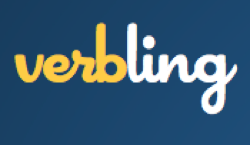 Verbling
Verbling
You can find our full coverage of Verbling’s launch here
If you’re like the average language learner, retaining new language information is difficult, because, by and large, language learning is tedious. Verbling allows language learners to practice with each other through live video. It instantly connects users with people learning Spanish in realtime, with 9K people having signed up for languages that aren’t even available yet. Traditionally, geographical distance between native speakers and learners is a huge obstacle in effectively learning a new language, so Verbling hopes to eliminate that issue by offering an easy realtime video solution.
 MobileWorks
MobileWorks
You can find our full coverage of MobileWorks here
MobileWorks lets you outsource tasks to workers abroad. The company handles the selection of these workers, promising that all of its outsourced labor is high-quality because of its screening process, reputation, and error control. The majority of crowdsourcing engines today fall into around ten buckets, like document digitization, web scraping, and speech recognition and MobileWorks allows you to take advantage of them all.
 Vidyard
Vidyard
Check out our prior coverage of Vidyard here
Vidyard is YouTube for business. The “YouTube rabbit hole”, says Vidyard, drives a business’ embedded video traffic (or clicks) off the site to YouTube. And there on YouTube, the comment for BlackBerry Playbook, for example, might contain a few negative comments, and an in-video ad might be the only way to drive customers back to the business’ website. Vidyard wants to create a “best practices solution” for all businesses using online video. The startup has raised $570K from SV Angel, Dennis Kavelman (the former COO of RIM), among others.
 Tagstand
Tagstand
You can find our prior coverage of Tagstand here.
Tagstand is an NFC platform that lets you order customized tags that include a bit.ly-like short URL service that lets you modify the URL each NFC points to after they’ve been deployed in the field by using an online dashboard (this dashboard also lets you track analytics for each individual stickers). The company is currently seeing a tripling in monthly revenues.
 Kicksend
Kicksend
Check out our prior coverage of Kicksend here
Kicksend is the easiest way to send and receive files with people you care about. Kicksend aims to make it even easier to send and share large files, especially with one’s non-technical friends and family members. Obviously, there are plenty of file sharing services available, but many of them are confusing to use or have needlessly complicated UIs, are expensive, or come with too much fine print.
As we wrote a few weeks ago, “users can sign up for an account or just login with their Facebook account to view which of their friends and family are already using Kicksend. Once a user is logged in, they follow a simple three-step process to send the files. Simply drag and drop the files (of any size) into the interface/prompt on Kicksend’s homepage and select the recipients, (the recipients need only an email address, they don’t have to be Kicksend users), and, then, press send. Pretty straightforward.”
 Vimessa
Vimessa
Vimessa lets you send video messages to anyone in the world. Vimessa Co-founder Peter Clark said that he likes to think of Vimessa as “video voicemail”, bringing the convenience of SMS to the “magic of Skype video”. Vimessa intends to be at the center of the front-facing camera revolution.
 Can’t Wait
Can’t Wait
You can find our coverage on Can’t Wait’s launch here.
Can’t Wait is a social network for video trailers. Can’t Wait sends you reminders when your favorite movies are launching in theaters, allowing users to buy tickets right from the native iPhone app. The app’s closest competitor is trailers.apple.com itself, but the only way to track the updates through Apple is via its RSS feed.
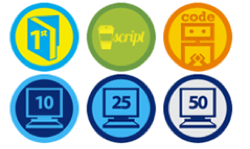 Codecademy
Codecademy
You can find our prior coverage on Codecademy here.
Codecademy teaches people how to start coding. Books and video aren’t good enough for most people looking to get started in coding, so Codecademy has built a simple, interactive way to get people coding. The app has been out for four days and already has over 250,000 users — and these are people that have actively completed an actual exercise. Most users spending more than 1 hour on the site. Eight simple lessons of JavaScript are available so far.
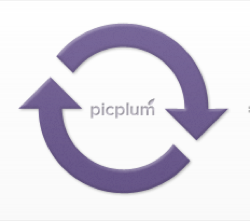 PicPlum
PicPlum
You can find our full coverage of PicPlum here
Picplum is a service that makes it easy to send print photos (as opposed to the digital kind) to your friends and loved ones on a regular basis, with very little effort required on your part. Sign up for the service, then email in your favorite photos as you take them — Picplum will handle the rest. The service starts at $7/month. This may sound a bit steep, but given how much hassle is involved with routinely choosing, then shipping photos, it may be well worth it.

Interstate
You can find our coverage on Interstate’s launch here.
Interstate’s goal is is to offer developers a tracking tool that hits the sweet spot between 37signals’s Basecamp — which they say is fairly basic — and PivotalTracker, which may be too complex for some purposes.
The application includes the functionality you’d expect from a development roadmap app: you can the current status of each task (and subtask), plot out where things should be over the coming weeks, and attach supplementary files to each task. You can also publicly share a portion of your roadmap with the public if you’d lie.
